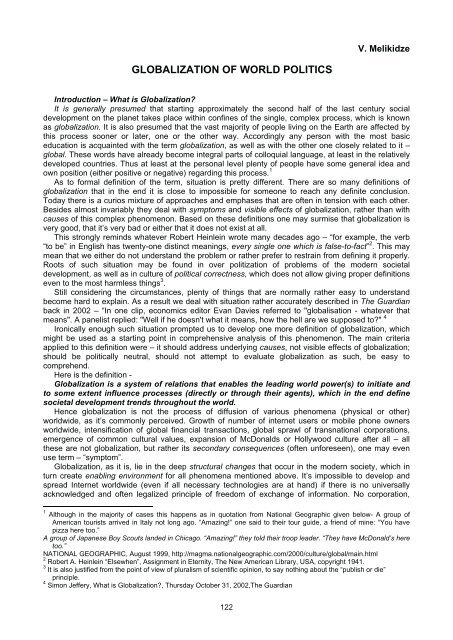V. MelikidzeGLOBALIZATION OF WORLD POLITICSIntroduction – What is Globalization?It is generally presumed that starting approximately the second half of the last century socialdevelopment on the planet takes place within confines of the single, complex process, which is knownas globalization. It is also presumed that the vast majority of people living on the Earth are affected bythis process sooner or later, one or the other way. Accordingly any person with the most basiceducation is acquainted with the term globalization, as well as with the other one closely related to it –global. These words have already become integral parts of colloquial language, at least in the relativelydeveloped countries. Thus at least at the personal level plenty of people have some general idea andown position (either positive or negative) regarding this process. 1As to <strong>for</strong>mal definition of the term, situation is pretty different. There are so many definitions ofglobalization that in the end it is close to impossible <strong>for</strong> someone to reach any definite conclusion.Today there is a curios mixture of approaches and emphases that are often in tension with each other.Besides almost invariably they deal with symptoms and visible effects of globalization, rather than withcauses of this complex phenomenon. Based on these definitions one may surmise that globalization isvery good, that it’s very bad or either that it does not exist at all.This strongly reminds whatever Robert Heinlein wrote many decades ago – “<strong>for</strong> example, the verb“to be” in English has twenty-one distinct meanings, every single one which is false-to-fact” 2 . This maymean that we either do not understand the problem or rather prefer to restrain from defining it properly.Roots of such situation may be found in over politization of problems of the modern societaldevelopment, as well as in culture of political correctness, which does not allow giving proper definitionseven to the most harmless things 3 .Still considering the circumstances, plenty of things that are normally rather easy to understandbecome hard to explain. As a result we deal with situation rather accurately described in The Guardianback in 2002 – “In one clip, economics editor Evan Davies referred to "globalisation - whatever thatmeans". A panelist replied: "Well if he doesn't what it means, how the hell are we supposed to?" 4Ironically enough such situation prompted us to develop one more definition of globalization, whichmight be used as a starting point in comprehensive analysis of this phenomenon. The main criteriaapplied to this definition were – it should address underlying causes, not visible effects of globalization;should be politically neutral, should not attempt to evaluate globalization as such, be easy tocomprehend.Here is the definition -Globalization is a system of relations that enables the leading world power(s) to initiate andto some extent influence processes (directly or through their agents), which in the end definesocietal development trends throughout the world.Hence globalization is not the process of diffusion of various phenomena (physical or other)worldwide, as it’s commonly perceived. Growth of number of internet users or mobile phone ownersworldwide, intensification of global financial transactions, global sprawl of transnational corporations,emergence of common cultural values, expansion of McDonalds or Hollywood culture after all – allthese are not globalization, but rather its secondary consequences (often un<strong>for</strong>eseen), one may evenuse term – “symptom”.Globalization, as it is, lie in the deep structural changes that occur in the modern society, which inturn create enabling environment <strong>for</strong> all phenomena mentioned above. It’s impossible to develop andspread Internet worldwide (even if all necessary technologies are at hand) if there is no universallyacknowledged and often legalized principle of freedom of exchange of in<strong>for</strong>mation. No corporation,1 Although in the majority of cases this happens as in quotation from National Geographic given below- A group ofAmerican tourists arrived in Italy not long ago. “Amazing!” one said to their tour guide, a friend of mine: “You havepizza here too.”A group of Japanese Boy Scouts landed in Chicago. “Amazing!” they told their troop leader. “They have McDonald’s heretoo.”NATIONAL GEOGRAPHIC, August 1999, http://magma.nationalgeographic.com/2000/culture/global/main.html2 Robert A. Heinlein “Elsewhen”, Assignment in Eternity, The New American Library, USA, copyright 1941.3 It is also justified from the point of view of pluralism of scientific opinion, to say nothing about the “publish or die”principle.4 Simon Jeffery, What is Globalization?, Thursday October 31, 2002,The Guardian122
however powerful, can become transnational, if countries where it wants to operate do not acknowledgeuniversal principles of freedom of trade and inviolability of a private property (even if under pressureand as regards this very company). Only such approach may move globalization from the realm ofinexplicable (as it often happens today), into the realm of opportunities. Whether and how variousactors operating worldwide are able to use these opportunities <strong>for</strong> their personal ends, is quite anotherproblem, which should be addressed on local, rather than the global level.As to the leading world power(s), they may be represented by any subject that is directly involved indecision making processes or is able to affect decision making by the others. I.e. such may be anyperson (private or public) or organization (also private or public; national or supranational, governmentor non-government), able to generate an initiative, which in the end might lead to world-wide systemicalterations. Naturally in the vast majority of cases these are sovereign states and international bodies,which possess enough power to generate such changes. 5 Besides today to be effective these changesshould be codified, <strong>for</strong>malized and legalized, whether on the international and/or the national levels,which again points out states and international organizations as the major perpetrators of globalization.Globalization is based on such quite primitive and well known process as expansion. Expansion is astandard tool <strong>for</strong> solving intra-systemic problems by moving them outside the system. Today this termbears mainly negative connotations being often associated with the Cold War era propaganda(communist, imperialist expansions) or debacles by the weak, dictatorial regimes (Argentina invadingFalklands in 1982 or Iraq occupying Kuwait in 1990). In reality expansion is more often the result ofadjustment of positive development trends and at least in case of the leading world countries is subjectto standard planning procedures (take EU expansion <strong>for</strong> instance). What particular <strong>for</strong>ms may acquireany given expansion process or what concrete mechanisms are applied to keep it moving does notmatter, as long as it is not the military one. 6Factually globalization may also be characterized as expansion, which reached its logical limit [withinthe limited Earth space]. On the other hand planned expansion is from the very beginning aimed at theconcrete, finite result and takes place in the controlled environment. Already mentioned EU expansionis the classic case of such. Despite its utmost importance it will never acquire the global character(something like the Global EU), since Europeans do not have enough motivation to aim at such targetand moreover are not able to generate enough impulse to implement such plan, even if the necessityarises.If one uses analogy from the modern physics, globalization may have a dual nature, like light, whichis both waves and discrete particles. It may simultaneously be situation and process. Globalizationprocesses may succeed only within the framework of the given system of relations, while the veryexistence of this system is prompted by the necessity to develop these processes.In principle processes causing globalization may be compared to waves that spread in variousdirections from their source. The closest analogy in this case may be concentric waves created bystone dropped into the water. Such waves may spread in all directions, or may be relatively narrow andintensive. In any case, processes that may cause changes worldwide can not be subjected to anyeffective control, although initiators may try to influence them with no or less guaranteed results.Since globalization processes spread through the highly inhomogeneous medium, they move withdifferent speed into the various directions, may be amplified coming into contact with the other similarprocesses, or be cancelled out. They may be considerably altered (sometimes all the way to theopposite), manifest themselves in a <strong>for</strong>m very much different from the original and thus return to theirinitiators.Today overcoming physical space or constraints [within the Earth] causes no problems <strong>for</strong> those,who are able to initiate global processes. Thus these processes are basically altered, slowed down,accelerated or extinguished in economic, social, cultural spaces. As a result quite often territorieslocated near the source of globalization processes may be excluded from them, or be subjected to themlater than the others, or in a pretty distorted <strong>for</strong>m. 7 On the other hand, territories located far from it maybecome the active, full-fledged actors of globalization.Simultaneously there exists another kind of expansion – less amenable to control and spontaneousthat craves <strong>for</strong> absolute results. This type of expansion was always found as an exception and with5 Of course some initially very weak push may in the end lead to global alterations – so called “butterfly effect”, althoughprobability of such occurrence seems to be very low.6 It may be political, economic, cultural, etc.7 We intentionally use term “territory” instead of “country” or “state” since globalization obviously do not manifest itselfwithin boundaries codified by men (often rather arbitrarily).123
- Page 1 and 2:
socialur mecnierebaTa seriamsofliop
- Page 3:
s a r C e v iSesavali .............
- Page 6 and 7:
situaciis arseboba, Tavis mxriv, am
- Page 8 and 9:
globalizacia — ori antagonisturi
- Page 10:
(informacia), vidre ramdenime aTeul
- Page 13 and 14:
TanamSromlobas. faqtiurad SesaZlebe
- Page 15 and 16:
1.3. msoflio politikis Teoriebi1.3.
- Page 17 and 18:
TanamSromlobaze uaris Tqma sul ufro
- Page 19 and 20:
danarCeni msofliosagan gansxvavebiT
- Page 21 and 22:
meqanizmebi ubralod ar arsebobs;•
- Page 23 and 24:
idga zemoT daxasiaTebul “piramidu
- Page 25 and 26:
amocanebis gadasaWrelad. 37es ar ni
- Page 27 and 28:
dacema, pirvel rigSi, materialuri d
- Page 29 and 30:
ealurad globaluri iyo. isini, isevd
- Page 31 and 32:
mSeneblobis procesSi klasobrivi brZ
- Page 33 and 34:
dolaris daxmareba miiRo.sainteresoa
- Page 35 and 36:
sistemas da gamoiwvia britaneTis im
- Page 37 and 38:
miekuTvneboda (ix. danarTi 3.1 da 3
- Page 39 and 40:
TiTqmis mTlianad ugulvebelyos is pr
- Page 41 and 42:
2.2.5. meore globalizaciis dros gag
- Page 43 and 44:
gakeTeba (iaponia). meore mxriv, er
- Page 45 and 46:
ac saboloo jamSi qmnis sistemis des
- Page 47 and 48:
laparakia imaze, rom romelime calke
- Page 49 and 50:
mmarTvelobis principebis adaptacia
- Page 51 and 52:
matareblebi arian. ukve es faqti aq
- Page 53 and 54:
warmoadgens nebismieri warmatebuli
- Page 55 and 56:
koloradosa da vaiomingis nawilebi.
- Page 57 and 58:
xSirad faqtiurad kulturuli misioner
- Page 59 and 60:
dasawyisSi oficialurad TviT aSS-ma
- Page 61 and 62:
mosaxleobis 20%, romelic yvelaze md
- Page 63 and 64:
sruli liberalizaciis Sesaxeb faqtiu
- Page 65 and 66:
gansxvavebebi, ganpirobebuli maTi e
- Page 67 and 68:
urTierTobaSi.3.4. zemoT aRwerili pr
- Page 69 and 70:
evri qveynisaTvis zemoT aRwerili ti
- Page 71 and 72: aSS saerTaSoriso daxmarebis naxevar
- Page 73 and 74: aSkarad sWarbobs evrogerTianebis ne
- Page 79 and 80: meore — Tanamedrove sabrZolo saSu
- Page 81 and 82: SeuZliaT, an ar awyobT efeqturi Ron
- Page 83 and 84: amoiwura.cnobili ebraeli moRvawe,
- Page 85 and 86: masze agebuli civilizaciis sistemur
- Page 87 and 88: eJimi mravali wlis manZilze xels uw
- Page 89 and 90: mxolod SedarebiT mcire nawils Seexo
- Page 91 and 92: daavadebebiT. am konfliqtSi monawil
- Page 93 and 94: naxevar saukunes moiTvlis. principS
- Page 95 and 96: kontrols eqvemdebareba.rac Seexeba
- Page 97 and 98: • faqtiurad nebismieri gadawyveti
- Page 99 and 100: 4.2.3. globalur doneze aseTi tipis
- Page 101 and 102: krizisebisagan, rom rodesac bazari
- Page 103 and 104: sabWoTa kavSirma gamomdinare nawilo
- Page 105 and 106: usafrTxoebis erT-erTi ZiriTadi elem
- Page 107 and 108: Microsoft-is top-menejerebs). sadac
- Page 109 and 110: veb-gverdebs; xolo Google-m 2006 we
- Page 111 and 112: saxiT, amerikis moqmedeba SedarebiT
- Page 113 and 114: organizaciebis da a.S.amave dros, r
- Page 115 and 116: 2 termini globaluri mainc uamravi s
- Page 117 and 118: 61 ssrk-s SemTxvevaSi etyoba misi g
- Page 119 and 120: 30-jer naklebia, vidre saavtomobilo
- Page 121: SesaZlebelia faqtiurad nebismieri s
- Page 125 and 126: 2. Does not matter in what sphere o
- Page 127 and 128: system, which leads to restoration
- Page 129 and 130: On the other hand, in the late 19 t
- Page 131 and 132: traceable here, technological compo
- Page 133 and 134: extremist than terrorists themselve
- Page 135 and 136: human rights is routine. 24The situ
- Page 137 and 138: Transformation of Islam, as the rel
- Page 139 and 140: countries, where the government and
- Page 141 and 142: Of course if the developed world ma
- Page 143 and 144: (including affiliated agencies and
- Page 145 and 146: including legal acts, represents re
- Page 147 and 148: passed by its more successful prede
- Page 149 and 150: principle should possess some cultu
- Page 151 and 152: coherent and purposeful than before
















